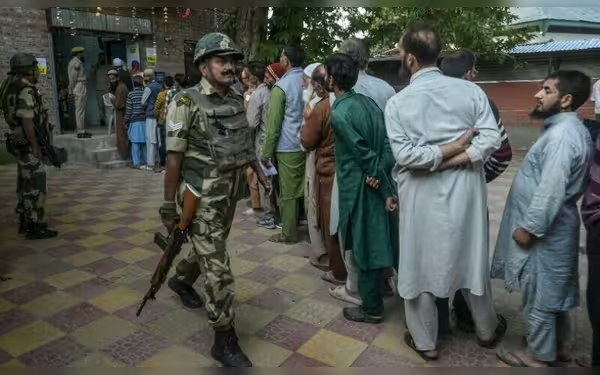Saturday, November 16, 2024 03:20 PM
Kashmir Elections Mark First Vote Post 2019 Status Revocation
- First elections in Kashmir since 2019 revocation.
- BJP faces criticism over independent candidates' strategy.
- Voter engagement signals hope for local governance.
 Image Credits: dawn.com
Image Credits: dawn.comKashmir holds its first elections since 2019, raising hopes for local governance amid concerns over central control.
In a significant political development, the region of India-held Kashmir is witnessing elections for the first time since the Indian government revoked its special status in 2019. This change has opened the door for local governance, allowing residents to participate in the democratic process after a long period of uncertainty and unrest. The revocation of Article 370, which granted special autonomy to Jammu and Kashmir, has been a contentious issue, leading to widespread debates and discussions about the future of the region.
The current election campaigns have been marked by vigorous activities and unusually open debates among candidates. This is a notable shift from the past, where political discourse was often stifled. Candidates are engaging with the electorate, discussing pressing issues such as development, security, and local governance. However, despite this newfound openness, key decisions regarding security and the appointment of the region's governor will still rest firmly in the hands of New Delhi. This central control raises questions about the true extent of autonomy that these elections can provide.
Critics of the ruling Bharatiya Janata Party (BJP) have voiced concerns over the party's strategy in the region. They accuse the BJP of promoting a surge of independent candidates in Muslim-majority areas, which they believe is an attempt to split the vote. This tactic could potentially dilute the influence of established political parties that have traditionally represented the interests of the local population. The implications of this strategy could be significant, as it may alter the political landscape in Kashmir for years to come.
As the elections unfold, the people of Kashmir are hopeful yet cautious. They are eager to exercise their right to vote and have their voices heard, but they remain aware of the overarching influence of the central government. The outcome of these elections will not only shape the immediate political environment but also set the tone for future governance in the region. It is a critical moment for Kashmir, one that could redefine its relationship with the rest of India.
The elections in India-held Kashmir represent a pivotal moment in the region's history. While the opportunity for local governance is a step forward, the overarching control from New Delhi raises important questions about the future of democracy in Kashmir. As residents cast their votes, they are not just choosing representatives; they are also expressing their hopes and aspirations for a peaceful and prosperous future. The world will be watching closely to see how this political experiment unfolds and what it means for the people of Kashmir.













